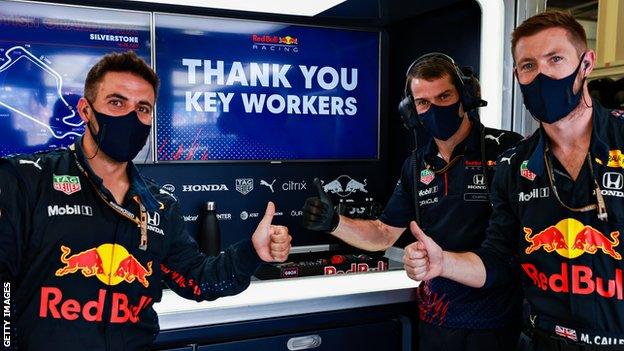Formula 1 to make Covid-19 vaccines mandatory for all personnel this year
- Published

The new rule will cover drivers, all team personnel, media, hospitality workers and guests
Formula 1 is to make Covid-19 vaccines mandatory for all personnel this year.
The move will mean no-one will be able to work within the paddock - F1's inner sanctum where the teams operate - without being fully vaccinated.
The policy will apply to all personnel working within F1, including drivers, teams, media, hospitality workers and any guests who attend the races.
It is not expected to have an impact on any of the drivers' ability to compete as all are understood to be vaccinated.
Double vaccination was a requirement of entry to the USA for last year's US Grand Prix in Austin, Texas.
The plan for all personnel to be vaccinated was agreed at last month's meeting of the world council of governing body the FIA but there has been a delay in communicating it.
The sport will also follow the vaccine and wider Covid policies of each national government of the countries it visits.
BBC Sport understands that the FIA is willing to consider individual exemptions on a case-by-case basis, as long as the individual in question was prepared to have a more rigorous testing regime than fully vaccinated people.
Having recovered from Covid will not be accepted as an exemption.
The decision to mandate vaccines, first revealed in the Times newspaper, external and confirmed by the FIA to BBC Sport, will lead to a relaxation of Covid restrictions within F1.
The frequency of testing will be reduced. In the case of a positive test, the close contacts will be identified based on national requirements.
The 'bubble' system introduced to limit people's contacts to ensure minimum disruption in the event of a positive test will no longer be mandatory, but will continue to be highly recommended by the FIA.
A spokesman for F1 - which runs the commercial side of the sport, including deciding the calendar - said: "F1 (FOM) will require all travelling personnel to be fully vaxxed and will not request exemptions."
The move comes as F1 prepares to embark on what it hopes will be a record 23-race calendar this season.
F1 was the first major international sport to start up again in the summer of 2020 after the pandemic hit, and it has successfully negotiated two seasons and a total of 39 races as a result of a stringent series of restrictions aimed at minimising the possibility of spreading the coronavirus.
Since the start of the pandemic, four drivers have had to miss races as a result of catching Covid - Sergio Perez and Lance Stroll when they were competing for Racing Point in 2020, Lewis Hamilton at the penultimate race of the 2020 season and Kimi Raikkonen at last year's Dutch and Italian Grands Prix.
Charles Leclerc, Lando Norris, Pierre Gasly and Nikita Mazepin have also contracted Covid out of competition.

No Passion, No Point: Adam Peaty reveals what he's had to sacrifice in pursuit of Olympic gold
The truth behind 'The Purple One': Will Prince now be known as evil or genius?
